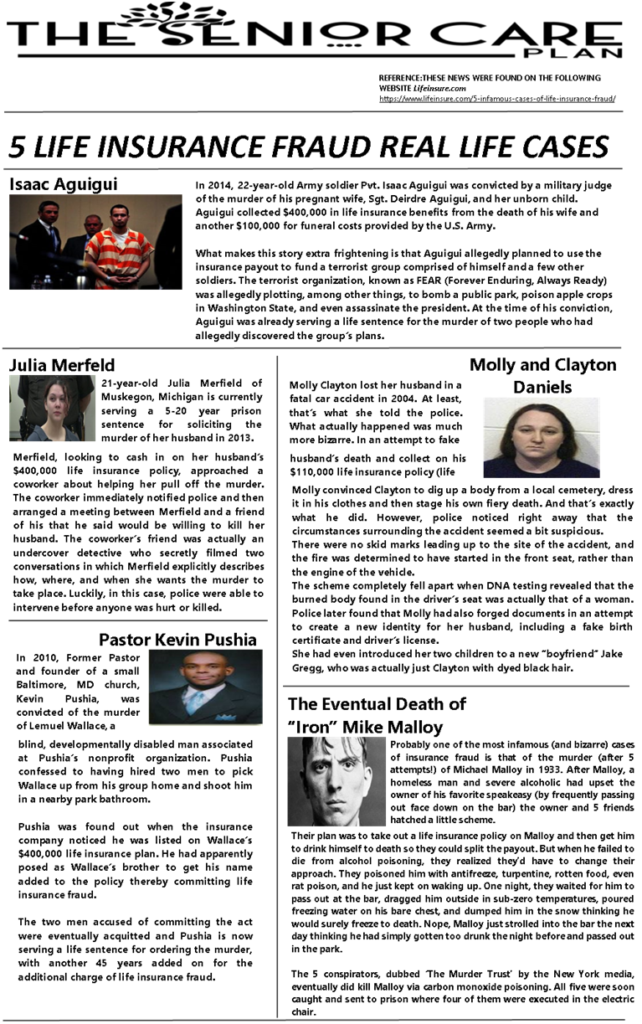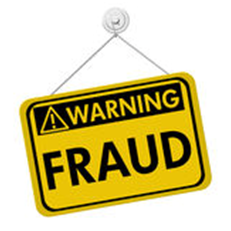WHAT IS INSURANCE FRAUD?
Insurance Fraud is an action that is contrary to the truth with the purpose of obtaining an economic benefit from an insurance process. This happens when a claimant tries to obtain a benefit or advantage they are not supposed to, or when an insurer denies a benefit which corresponds to the insured. Insurance frauds are characterized by lying, inappropriate use of funds, alteration of data, corruption, etc. Frauds can be carried out by individuals as well as by groups or entities. Even though there are many types of insurance frauds such as Health care insurance fraud, Automobile fraud, properity insurance fraud etc, we will be concentrating on Life Insurance Fraud.
HOW DOES INSURANCE FRAUD WORK?
 Insurance fraud is an attempt to alter an insurance contract. We know that insurances are to protect against any risk; but not to enrich the insured. Some people are so eager to take advantage, that resource to acts such as faking death, exaggerating claims and committing murder in some cases just for receiving the insured money.
Insurance fraud is an attempt to alter an insurance contract. We know that insurances are to protect against any risk; but not to enrich the insured. Some people are so eager to take advantage, that resource to acts such as faking death, exaggerating claims and committing murder in some cases just for receiving the insured money.
Not all insurance frauds are committed by policyholders, a great number of frauds are also done by insurance agents or agencies. The two most common type of fraud include premium diversion and fee churning.
Premium diversion is actually the most common type of insurance fraudand it occurs when insurance agents or agencies simply keep in their own pocket policyholder’s monthly premium instead of sending it along to the underwriters. In some cases, unlicensed insurance agents will sell insurance, keep the premiums and then refuse to pay any claims. This is particularly common with worker’s compensation insurance because of the high dollar amounts associated with that type of group insurance.
Fee churning generally happens when an insurance agent continually changes a life insurance policy to different carriers in order to receive a commission. Insurance agents are charged with choosing the best policy for the client, but instead, they will often move the policy around to get a commission for themselves from different companies. When this happens, the policyholder’s premiums often increase because life insurance gets more expensive as you get older and, in many cases, their coverage amount decreases.
WHAT IS LIFE INSURANCE FRAUD?

Not only fraud can be comm itted against an insurance agency but also vice versa. It is also considered insurance fraud when an insurance company, agent, or claim adjuster commits a deliberate deception in order to obtain an illegitimate gain, it can occur during the process of buying, using, selling or underwriting insurance. Fake insurance companies and dishonest insurance agents can defraud clients by collecting premiums for bogus policies with no intention or ability to pay claims.
These “companies” may offer policies with a really low cost, lower than the traditional market price in order to convinceconsumers who are trying to save money. In many cases, a fake insurance company will provide clients with documents that look real. In other instances, these policies may even be represented by legitimate insurance agents who themselves have been misled by fraudulent companies.

TYPES OF LIFE INSURANCE FRAUD.
Not every type of life insurance fraud is common neither the same, but understanding what some agency’s and consumers go through can help you learn to detect the security your application receives.
⦁ APPLICATION FRAUD
 Application fraud is when even of being aware, wrong information is provided when applying for insurance. This is also called material misrepresentation.
Application fraud is when even of being aware, wrong information is provided when applying for insurance. This is also called material misrepresentation.
When applying for insurance there are two types of informartion given to carriers:
* The informitaion included in your initial application and given to the agent during the mandatory phone interview.
*The information pulled from the MIB (Medical Information Bureau) for your medical records.
When the underwritters are reviewing your application, the information pulled from the MIB is used to verify what you’ve previosly shared to the agent. On some occasions we may forget a medical procedure that we had years ago or perhaps the weight we gave no longer matches. The underwritters adjust the medical history and provide new monthly rates since this is not considered fraud due to the fact that that we did not provide the wrong information intentionally.
But if you, on the other hand, lie conscientiously, for example saying that you do not smoke but your medical records says otherwise, that you have been smoking for a long time, this is considered fraud. The insurance company could reject your application on the ground of material misrepresentation as they can also charge you even higher rates than if you had told the truth in the first place.
When applying for insurance it is very important to be as honest as possible. This not only provides us with the most accurate quote, but we avoid getting into serious and even legal problems and getting our application or a claim declined for fraud.
⦁ CLAIMS FRAUD (FAKE DEATH)
Faking death is one of the most common types of fraud. The premise is very simple. Usually the policyholder will acquire a large life insurance coverage for themselves and then after a short time period, they fake their own death. Their beneficiary or beneficiaries receive the insurance payout and they just simply come out like nothing never happened with their really generous insurance payout. As surprising as it seems this is actually something really common that often happens.

Another attempt to defraud insurance companies, the beneficiary killing the insured in order to get a payout. This is rare, and illegal; laws make it illegal to profit from murder, and if a beneficiary kills an insured, the payout will go to the contingent beneficiary or to the insured’s estate.
These are both illegal and will result not only in denied claims, but could result in prosecution.
⦁ FORGERY
 Most life insurance fraud doesn’t involve the insured at all, instead it involves other parties that acces the policy and change the policy owner or beneficiaries. Only the policy owner can change the beneficiaries or other details about a policy. This type of fraud can also result in denied claims and prosecution.
Most life insurance fraud doesn’t involve the insured at all, instead it involves other parties that acces the policy and change the policy owner or beneficiaries. Only the policy owner can change the beneficiaries or other details about a policy. This type of fraud can also result in denied claims and prosecution.
⦁ PHONE POLICY FRAUD (POCKETING PREMIUMS)
Another kind of fraud is phone policy fraud. This is when a scammer pretends to be de an insurance agent and tries to “sale” fake policies to unexpecting clients and keep the monthly premiums. Like other kind of financial scams, these scammers use names of recognized agencies to make the sale then request cash or direct payments.
A way to protect yourself from these type of scams is by working with a licensed insurance agent. When they try to make you a phone sale always ask the agent for their license number and check them out in your state’s licensed agent website.

Another way to know when it’s a scam is that life insurance agencies will never ask for cash. Their payments should always be made out directly to the insurance company. Brokers and agents can process the payments, but checks should be made out to the company itself, never an individual.
⦁ UPSELLING
 Some insurance agents will try to upsell you to a insurance policy you don’t really need. They will try to scare you into thinking that you need that expensive extra protection for you and your family, when what they really want is to make comissions out of your premiums. Somo agents don’t know this but this is actally a type of insurance fraud. As a consumer this is something it should be of your understanding and stand your ground if an agent is trying to upsell you.
Some insurance agents will try to upsell you to a insurance policy you don’t really need. They will try to scare you into thinking that you need that expensive extra protection for you and your family, when what they really want is to make comissions out of your premiums. Somo agents don’t know this but this is actally a type of insurance fraud. As a consumer this is something it should be of your understanding and stand your ground if an agent is trying to upsell you.
HOW TO AVOID LIFE INSURANCE FRAUD.

Consequences of insurance fraud.
Life insurance fraud often results in both state and federal prosecution. In the worst cases, you could end up serving a very lengthy prison sentence. However, even if you don’t end up going to jail, you could still end up paying a significant amount in financial restitution to those affected by the fraud. If you’re a licensed agent, you could also have your license removed. The consequences depend on the severity and particulars of the case.

Even if you aren’t prosecuted, you’ll still be stuck with serious consequences if you commit any sort of insurance fraud and get caught, no matter how in significant. In some cases, you’ll just be denied insurance coverage for the rest of your life, which means you and your loved ones will be unprotected in the event of an accident. This could lead to serious financial challenges. If for some reason you are still able to qualify for insurance, your premiums will be really high, as companies will now consider you a risk to insure since you’ve comimitted fraud before.
Reporting Fraud
If you want to report fraud being committed by an agent or broker, contact the Investigation Division. If you want to report fraud being committed by an employee, employer, medical provider, legal provider or someone that is committing some type of insurance fraud, contact the Fraud Division.
 http://www.insurance.ca.gov/0300-fraud/reportingfraud.cfm
http://www.insurance.ca.gov/0300-fraud/reportingfraud.cfm

